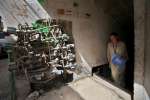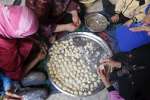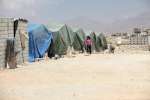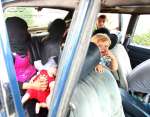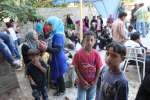Funding shortage leaves Syrian refugees in danger of missing vital support
News Stories, 25 June 2015
AMMAN, Jordan, June 25 (UNHCR) – Humanitarian and development assistance efforts for 3.9 million Syrian refugees and more than 20 million people living in hosting communities in neighbouring countries are in serious danger as a result of a severe funding crisis, the UN refugee agency has warned.
A report, released in Amman on Thursday, by more than 200 partners in the Regional Refugee & Resilience Plan (3RP) in Response to the Syria Crisis said programmes implemented by the UN and NGOs under the plan faced a current funding gap of a staggering US$3.47 billion.
The 3RP report called on the international community to act faster to deliver on its pledges of support. "We are so dangerously low on funding that we risk not being able to meet even the most basic survival needs of millions of people over the coming six months," UN High Commissioner for Refugees António Guterres said.
Guterres also called for more solidarity and responsibility-sharing from the international community "than what we have seen so far."
The report showed that against the $4.53 billion required for programmes implemented by UN agencies and NGOs under the plan launched last December, only $1.06 billion – 23 per cent – had been received as of the end of May.
Already, this has meant that 1.6 million refugees have had their food assistance reduced this year; 750,000 children are not attending school; and life-saving health services are becoming too expensive for many, including 70,000 pregnant women at risk of unsafe deliveries.
Some 86 per cent of urban refugees in Jordan live below the poverty line of 3.2 dollars a day, while 45 per cent of refugees in Lebanon live in sub-standard shelters.
Almost half of all those affected by this crisis are children, many of whom struggle to cope with distress caused by the violence and upheaval they have experienced.
The 3RP partners warned that if more funds were not forthcoming soon, up to 130,000 vulnerable families would not be provided with cash assistance to help them meet basic needs and vulnerable people would stop receiving monthly food vouchers altogether.
Without urgently needed funds, the delivery of water and waste water services for millions of people across the region will also be in jeopardy. Up to 1.7 million people may face winter this year without fuel, shelter, insulation, blankets or warm clothes.
Halfway through the year, with less than a quarter of the required funding received and with winter just around the corner, 3RP partners urgently need funding certainty to plan and respond in time. Last year a number of people, including children, lost their lives during the harshest winter the region has seen in four decades
The Syria crisis has also had major social and economic impacts on host countries, which remain at the forefront of the crisis and are going through political, economic, social and security instabilities. Now in its fifth year, the Syria crisis is also having an impact on development and global security.
UN Development Programme (UNDP) Administrator Helen Clark said the lessons learned over the past four years of response to the Syria crisis showed "beyond doubt the importance of integrated humanitarian and development approaches based on building resilience." She added that "a well-funded 3RP will support stabilization by helping people get jobs, have access to microbusiness opportunities, and improve food security for families."
The report noted that while pressures on host countries continue to grow, it is increasingly difficult for Syrians to find safety, including by seeking asylum. These difficulties have resulted in an increased number of Syrians seeking safety and refuge beyond the region, including by taking often dangerous journeys across the Mediterranean to Europe. Many Syrians have lost their lives as a result.
The report called on the international community to share more of the burden with host countries through the timely provision of funding and by providing solutions like additional resettlement opportunities and other forms of humanitarian admission for Syrian refugees.
The 3RP partners warned that if the call for action remains unheeded, a generation of Syrians would be left behind and neighbouring countries would continue to struggle to provide a public good they cannot and should not have to bear alone.
The Regional Refugee and Resilience Plan is an international appeal aimed at addressing refugee protection needs, the humanitarian needs of the most vulnerable, and the longer-term socio-economic impacts of the Syria crisis on neighbouring countries of Turkey, Lebanon, Jordan, Iraq and Egypt.
Click here to access the report.





